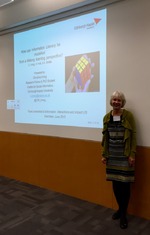Reflections from Information: Interactions and Impact (i3) Conference
 Tuesday, June 30, 2015 at 2:40PM
Tuesday, June 30, 2015 at 2:40PM
 Christine Irving presenting at i3 2015
Christine Irving presenting at i3 2015
i3 is a great event to attend and speak at. My thanks to everyone who attended my presentation How can information literacy be modelled from a lifelong learning perspective?
Now that the Conference is over, it is time to start writing the full paper for the special issue of the Journal of Information Science (JIS).
Before I do I want to share some information literacy highlights with you:
- Syeda Hina Shahid citing my work Begin at the begining information and critical literacy in curriculum for excellence early & first level nursery & primary schools in her presentation Assessing children's IL skills: findings from a multiple case study of six primary schools in Pakistan. Her paper is based on her PhD research work.
- Dorothy Williams keynote - An information conundrum. Dorothy talked about information being so much a part of us we can't see it. That it is an everyday word, common place, part of our world. She posed the question 'The world already knows information is so important ... don't they?
- Prof Agusta Palsdotti - Informal caregivers of people with dementia: the first stages in the information behaviour process. The ongoing study investigates how the relatives of people with dementia act as informal caregivers and support them with information. Whilst this study is situated in Iceland, Iceland is not alone in the growing proportion of elderly people. As Agusta states 'How people are able to receive support with information [is] vital for their health and welfare [it] is of great significance. Today's information environment consists of a variety of information sources that can be accessed in various ways and by different means. However, not all members of the society are able to benefit from it and people with dementia are in urgent need for support from their informal caregivers.' This study raises a number of issues including the need to support carers. As a carer myself I know how difficult it can be to locate and navigate health resources including health professionals for loved ones. It requires all your information literacy skills and capabilities plus a knowledge of the health and social landscape in your area and country.
- Dr. Annemaree Lloyd - Knowing and learning in everyday spaces (KaLieds): The role of Information literacy and literacies of information in supporting refugee youth learning outside school. it is always interesting to hear about the work Annemaree is involved in. The project Knowing and Learning in Everday Spaces (KaLiEDS) investigated the role that everyday spaces play in in the information literacies and learning of refugee youth. I was interested in the photo voice technique. Refugees were given digital cameras and tasked with taking photographs of the information resources that were important to them and the places where that information was located. It reminded me of an induction intitiatve that used this technique. It also reminded me of the resources that we as residents, tourists and visitors use to find our way about new cities and towns for example shopping centre catalogues/guides looking for best buys or places to go. Annemaree talks about information landscapes. A concept that I like. As she says '... information landscapes of participants are intricate and complex (e.g. faith-based groups; sporting teams; family and digital spaces). I think it is important for everyone to recognise information landscapes, their own and others who they interact with. I'm also taken with 'literacies for information'. Something to think about ...
I have more thoughts to share but that will need to be another day. In the meantime have a look at Sheila Webber's http://information-literacy.blogspot.co.uk/ she was live blogging from the conference. The conference twitter feed was #i3RGU
Once the presentations are available online then I'll provide links to them.

